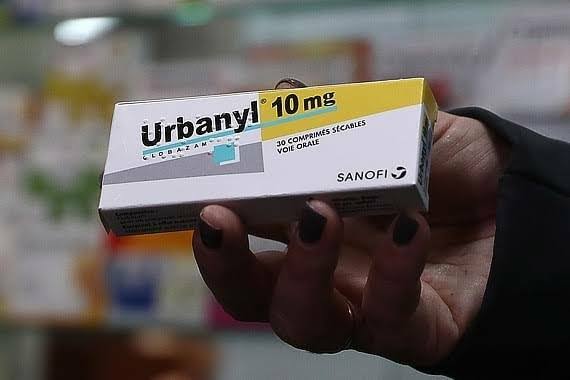Urbanyl: Uses, How It Works, Dosage, Side Effects, Warnings

Urbanyl is a brand name for a medication called clobazam. Clobazam belongs to a class of drugs known as benzodiazepines, which are commonly used to treat various conditions, including anxiety, seizures, and muscle spasms.
Clobazam the active ingredient in Urbanyl is primarily prescribed as an adjunctive treatment for seizures associated with Lennox-Gastaut syndrome, a severe form of epilepsy that often begins in childhood. It helps to reduce the frequency and intensity of seizures in people with this condition.
Like other benzodiazepines, clobazam works by enhancing the activity of a neurotransmitter called gamma-aminobutyric acid (GABA) in the brain. GABA has a calming effect and helps to regulate neuronal excitability, which can help control seizures and reduce anxiety.
It’s important to note that Urbanyl should be used only under the supervision and prescription of a qualified healthcare professional. They will consider your specific condition, medical history, and other factors to determine the appropriate dosage and duration of treatment.
Is Urbanyl a controlled substance?
Yes, Urbanyl is a controlled substance, which is a medication whose use is specially regulated under federal law. The Drug Enforcement Administration (DEA) places medications into “schedules” based on several factors. These factors include the medical uses for the drug, the drug’s known safety risks, and the drug’s potential for misuse. The schedules range from Schedule II (the most severe) to Schedule V (the least severe). Drugs that don’t appear to have the potential for misuse won’t have a schedule at all.
Urbanyl is a Schedule IV medication. This means that although Urbanyl has a risk of misuse and causing you to become dependent on it, the risk is lower compared with other controlled substances.
Urbanyl is available as a generic drug called clobazam. A generic drug is an exact copy of the active drug in a brand-name medication. The generic is considered to be as safe and effective as the original drug. Generics tend to cost less than brand-name drugs.
In some cases, the brand-name drug and the generic version may come in different forms and strengths. Urbanyl contains the active drug clobazam. (As the active drug, clobazam is the ingredient that makes Urbanyl work.)
Urbanyl dosage
The Urbanyl dosage your doctor prescribes will depend on several factors. These include:
• how well you respond to Urbanyl
• your weight and age
• other medical conditions you may have
With Urbanyl, your doctor will start you on a low dosage. Then they’ll adjust it over time to reach the amount that’s right for you. Your doctor will ultimately prescribe the smallest dosage that provides the desired effect.
The following information describes dosages that are commonly used or recommended. However, be sure to take the dosage your doctor prescribes for you. Your doctor will determine the best dosage to fit your needs.
Drug forms and strengths
Urbanyl comes in two forms. One is a tablet that you swallow. The tablet is available in two strengths: 10 milligrams (mg) and 20 mg.
The other form of Urbanyl is a suspension (a type of mixture in liquid). You use an oral syringe to swallow the medication. The suspension is available in one strength: 2.5 mg per milliliter mg/mL.
Dosage for seizures
The Urbanyl dosage for seizures depends on your body weight.
If you weigh more than 66 pounds (30 kilograms), you’ll start by taking 10 mg of Urbanyl a day. The dose is divided into two: 5 mg in the morning and 5 mg in the evening.
If 10 mg doesn’t work for you, your doctor may increase your dosage to 20 mg a day. You’ll take this as two separate doses: 10 mg in the morning and 10 mg in the evening. Your doctor won’t likely make this increase in dosage any sooner than 7 days after you started using Urbanyl.
If the 20-mg dosage isn’t working for you, your doctor can again increase your total daily dose to 40 mg. You’ll take this as two separate doses: 20 mg in the morning and 20 mg in the evening. Your doctor likely won’t make this increase in dosage any sooner than 14 days after you started using Urbanyl.
Your doctor may give you a different dosage depending on several factors, including your age and whether you have liver disease. If you have questions about the dosage that’s right for you, talk with your doctor.
Pediatric dosage
Urbanyl is approved for use in children ages 2 years and older. For children weighing less than 66 lb (30 kg), the starting dosage of Urbanyl is 5 mg, once a day.
If the 5-mg dose isn’t effective, your child’s doctor can increase the dosage to a total of 10 mg a day. Your child will take this as two separate doses: 5 mg in the morning and 5 mg in the evening.
If the 10-mg dose still isn’t effective, your child’s doctor can increase the Urbanyl dosage again to a total of 20 mg a day. Your child will take this as two separate doses: 10 mg in the morning and 10 mg in the evening.
What if I miss a dose?
To help make sure that you don’t miss a dose, try setting a reminder on your phone. A medication timer may be useful, too.
Will I need to use this drug long-term?
Urbanyl is meant to be used as a long-term treatment. If you and your doctor determine that Urbanyl is safe and effective for you, you’ll likely take it long-term.
Urbanyl side effects
Urbanyl can cause mild or serious side effects. The following lists contain some of the key side effects that may occur while taking Urbanyl. These lists don’t include all possible side effects.
Mild side effects
Mild side effects of Urbanyl can include:
• constipation
• feeling unusually sleepy or drowsy
• having less energy than usual
• trouble sleeping
• acting aggressively or violently, or feeling more angry than usual
• fever
• drooling
• vomiting
• ataxia (trouble controlling or coordinating your muscles)
• upper respiratory infection
Most of these side effects may go away within a few days or a couple of weeks. But if they become more severe or don’t go away, talk with your doctor or pharmacist.
* This is a partial list of mild side effects from Urbanyl. To learn about other mild side effects, talk with your doctor or pharmacist, or visit Urbanyl’s Medication Guide.
Serious side effects
Serious side effects from Urbanyl aren’t common, but they can occur. Call your doctor right away if you have serious side effects. Call 911 if your symptoms feel life threatening or if you think you’re having a medical emergency.
Serious side effects can include:
• allergic reaction
• severe drowsiness
• serious skin reactions, such as Stevens-Johnson syndrome (SJS) and toxic epidermal necrolysis (TEN)
• depression and suicidal thoughts or behaviors
Side effects in children and toddlers
Urbanyl is approved for use in children ages 2 years and older. Side effects in children aren’t expected to be any different from those in adults.
You may wonder how often certain side effects occur with this drug, or whether certain side effects pertain to it. Here’s some detail on some of the side effects this drug may or may not cause.
Allergic reaction
As with most drugs, some people can have an allergic reaction after taking Urbanyl. It’s unknown how many people have had this side effect with the medication.
Symptoms of a mild allergic reaction can include:
• skin rash
• itchiness
• flushing (warmth and redness in your skin)
A more severe allergic reaction is rare but possible. Symptoms of a severe allergic reaction can include:
• swelling under your skin, typically in your eyelids, lips, hands, or feet
• swelling of your tongue, mouth, or throat
• trouble breathing
Call your doctor right away if you have a severe allergic reaction to Urbanyl. Call 911 if your symptoms feel life threatening or if you think you’re having a medical emergency.
Severe drowsiness
It’s common to experience drowsiness while taking Urbanyl. Here’s what researchers found in clinical trials:
• 17% to 32% of people who took Urbanyl reported feeling drowsy or sedated, depending on the dose they took.
• In comparison, 15% of people who took a placebo (treatment with no active drug) reported drowsiness.
In most people, the drowsy or sedated feeling began the first month they started using Urbanyl. For some people, the feeling went away after they kept taking Urbanyl.
Central nervous system depressant
Urbanyl can cause drowsiness because it’s a type of drug called a central nervous system (CNS) depressant. Your CNS is made up of your brain and your spinal cord. Your spinal cord contains nerves that your brain uses to send signals to the rest of your body.
CNS depressants are a type of medication called a sedative, which slows down your CNS and can cause side effects like drowsiness.
Drowsiness related to dose
In some people, Urbanyl can cause severe drowsiness. The severity of drowsiness is related to the dose. So if you take a higher dose of Urbanyl, you may be at a greater risk for severe drowsiness. If you use other medications that cause drowsiness, that can also place you at a higher risk for experiencing severe drowsiness.
Because of the possible drowsiness, you’ll want to avoid any activity that requires you to be mentally alert until you know how Urbanyl will affect you. This includes driving a car or operating heavy machinery.
If you have any concerns about feeling drowsy while using Urbanyl, talk with your doctor.
Fever
Fever was one of the more common side effects reported by people who used Urbanyl in clinical trials. Researchers found the following:
• Depending on the dose of Urbanyl people took, 12% to 17% of them reported having a fever.
• Only 3% of people who took a placebo had this side effect.
Fever can also be a symptom of upper respiratory infections (URIs), such as the common cold. A URI is another potential side effect of Urbanyl.
If you develop a fever while taking Urbanyl, tell your doctor. They can help determine whether it’s due to an infection or if it’s a side effect of the drug.
Serious skin reaction
Although rare, Urbanyl has caused serious skin reactions in both adults and children. These reactions include Stevens-Johnson syndrome (SJS) and toxic epidermal necrolysis (TEN). The reactions weren’t reported in clinical trials, but they occurred since the drug was released onto the market.
Symptoms of SJS or TEN can include:
• skin blisters
• skin rash
• hives (itchy welts on your skin)
• sores in your mouth
Be sure to check for the above symptoms while taking Urbanyl, especially during the first 8 weeks of use. If you think you’re having a serious skin reaction, call your doctor right away. In some cases, SJS and TEN can be life-threatening.
Weight gain
Weight gain isn’t a direct side effect of Urbanyl. However, the drug can cause increased appetite in some people, which could lead to weight gain. In clinical trials, 2% to 5% of people who took Urbanyl reported an increase in appetite, depending on the dose. No one who took a placebo reported this side effect.
If you’re concerned about an increase in your appetite while using Urbanyl, talk with your doctor. They can help review your diet and exercise habits.
Depression and suicidal thoughts or behaviors
Like other medications used for treating epilepsy, Urbanyl can cause depression and suicidal thoughts or behaviors.
Clinical studies showed that suicidal thoughts or behaviors were observed:
• two times more often in people who took epilepsy medications like Urbanyl (0.43% of people who took epilepsy drugs compared with 0.24% of people who took a placebo)
• in about 1 of every 530 people who took epilepsy medications like Urbanyl
These rare but serious symptoms were seen as soon as 1 week after people started using the medication and continued throughout the treatment.
When starting Urbanyl treatment, pay close attention to your feelings, thoughts, moods, and behaviors. You’ll want to be on the lookout for any changes, especially sudden ones, in your thoughts, moods, and actions. These could be side effects due to Urbanyl.
Symptoms of depression and suicidal thoughts or behaviors
Symptoms of depression and suicidal thoughts or behaviors can include:
• new or worsened anxiety, depression, or irritability (feeling irritable)
• having thoughts about dying or suicide
• panic attacks
• insomnia (trouble sleeping)
• other unusual changes in your typical mood or behaviors
• an urge to act on dangerous impulses
If you have any of these symptoms, call your doctor right away. They’ll be able to work with you to determine if these are a result of Urbanyl or if something else could be causing your symptoms. They can also see whether a different medication may work better for you.
Suicide prevention
If you know someone at immediate risk of self-harm, suicide, or hurting another person:
• Ask the tough question: “Are you considering suicide?”
• Listen to the person without judgment.
• Call 911 or the local emergency number, or text TALK to 741741 to communicate with a trained crisis counselor.
• Stay with the person until professional help arrives.
• Try to remove any weapons, medications, or other potentially harmful objects.
If you or someone you know is having thoughts of suicide, a prevention hotline can help. The 988 Suicide and Crisis Lifeline is available 24 hours a day at 988. During a crisis, people who are hard of hearing can use their preferred relay service or dial 711 then 988.
Urbanyl use with other drugs
Urbanyl is approved to treat seizures in people who have a rare type of epilepsy called Lennox-Gastaut syndrome (LGS). For this purpose, Urbanyl is used as an adjunctive treatment, which means you’ll take the drug with other epilepsy medications. (Urbanyl isn’t approved to be used as the only seizure medication in people with LGS.)
Examples of other epilepsy medications that you may take with Urbanyl include:
• divalproex sodium (Depakote)
• lamotrigine (Lamictal)
• levetiracetam (Keppra)
• topiramate (Topamax)
Urbanyl and alcohol
You shouldn’t drink alcohol while taking Urbanyl. Alcohol and Urbanyl are both substances known as central nervous system (CNS) depressants. Your CNS is made up of your brain and your spinal cord. Your spinal cord contains nerves that your brain uses to send signals to the rest of your body. CNS depressants slow down your CNS, and this can cause side effects like drowsiness and excessive sleepiness.
Combining two CNS depressants, such as alcohol and Urbanyl, can further increase your risk for side effects, including serious ones. (See the “Urbanyl side effects” section above to learn more.)
In addition to being a CNS depressant, alcohol can also increase the level of Urbanyl in your body.
If you drink alcohol and are thinking about using Urbanyl, talk with your doctor.
Urbanyl interactions
Urbanyl can interact with several other medications. Different interactions can cause different effects. For instance, some interactions can interfere with how well a drug works. Other interactions can increase the number of side effects or make them more severe.
FDA warning: Urbanyl use with opioids
The Food and Drug Administration (FDA) has issued a boxed warning for Urbanyl regarding using the drug with opioid medications. A boxed warning is the most severe warning from the FDA.
The use of Urbanyl with opioids can cause severe side effects. These effects can include sedation (extreme drowsiness or tiredness) and respiratory depression (slow and weak breathing). They can also include coma and, in some cases, death.
Your doctor will prescribe Urbanyl with an opioid only when no other treatments will work for you. And if you do use Urbanyl with an opioid, you should take the lowest dose of Urbanyl that’s effective for you. Your doctor will monitor you for symptoms of sedation and respiratory depression during your Urbanyl treatment.
Urbanyl and other medications
Below are some other medications that can interact with Urbanyl. This section doesn’t contain all drugs that may interact with Urbanyl.
Before taking Urbanyl, talk with your doctor and pharmacist. Tell them about all prescription, over-the-counter, and other drugs you take. Also tell them about any vitamins, herbs, and supplements you use. Sharing this information can help you avoid potential interactions.
If you have questions about drug interactions that may affect you, ask your doctor or pharmacist.
Urbanyl and other drugs that can affect your central nervous system
Urbanyl is a type of drug called a central nervous system (CNS) depressant. Your CNS is made up of your brain and your spinal cord. Your spinal cord contains nerves that your brain uses to send signals to the rest of your body. CNS depressants slow down your CNS, and this can cause side effects like drowsiness and excessive sleepiness.
Combining two CNS depressants can further increase your risk for side effects, including serious ones. (See the “Urbanyl side effects” section above to learn more.)
Examples of other CNS depressants include:
• opioids (see the “FDA warning: Urbanyl use with opioids” section above)
• other benzodiazepines, such as alprazolam (Xanax) and zolpidem (Ambien)
• diphenhydramine (Benadryl)
• muscle relaxers, such as baclofen (Lioresal) and cyclobenzaprine
• medications used for certain mood disorders, such as haloperidol (Haldol)
• medications used for insomnia (trouble sleeping), such as eszopiclone (Lunesta)
It’s not recommended that you use Urbanyl with another CNS depressant. But if no other treatments will work for your condition, you may have to take both medications. If this is the case, your doctor will monitor you very closely for any side effects. And they’ll try to keep the doses of your medications as low as possible.
Urbanyl and certain drugs that affect how your body breaks down Urbanyl
Taking Urbanyl with certain medications that affect how your body metabolizes (breaks down) Urbanyl can change the level of Urbanyl in your system. This can increase your risk for side effects. See the “Urbanyl side effects” section above to learn more.
Examples of medications that can affect your body’s level of Urbanyl include:
• fluconazole (Diflucan)
• fluvoxamine (Luvox)
• omeprazole (Prilosec)
Tell your doctor about all the medications you take. They can determine if any will affect how your body breaks down Urbanyl. If you need to take one of these drugs during your Urbanyl treatment, your doctor will monitor you closely for side effects. They may also change your dose of Urbanyl or switch you to a different medication for seizures.
Urbanyl and hormonal birth control
If you use hormonal contraception (birth control that contains hormones), keep in mind that Urbanyl may make it less effective. This is because Urbanyl can speed up how quickly your body processes hormonal contraception. With a lower level of hormonal contraception in your body, you have an increased risk for becoming pregnant.
Examples of hormonal contraceptives include:
• birth control pills, such as:
o ethinyl estradiol/drospirenone/levomefolate (Beyaz)
o ethinyl estradiol/norethindrone acetate (Loestrin)
o ethinyl estradiol/drospirenone (Yasmin, Yaz)
• birth control shot:
o medroxyprogesterone acetate (Depo-Provera)
• birth control ring:
o etonogestrel/ethinyl estradiol (NuvaRing)
• birth control patch:
o ethinyl estradiol/norelgestromin
Nonhormonal forms of birth control
If you are using a hormonal contraceptive, your doctor may recommend that you switch to a nonhormonal form of birth control while taking Urbanyl.
Examples of nonhormonal forms of birth control include:
• condoms
• diaphragm
• Paragard intrauterine device (IUD)
• spermicides
If you have additional questions about birth control while using Urbanyl, see the “Urbanyl and birth control” section below and talk with your doctor.
Other IUDs
Certain IUDs contain levonorgestrel, making them a type of hormonal contraception. These include Kyleena, Liletta, Mirena, and Skyla.
However, a small studyTrusted Source showed that the use of Mirena with epilepsy drugs didn’t affect how well Mirena worked.
If you’re using one of these IUD products, talk with your doctor about your specific birth control needs before taking Urbanyl.
Urbanyl and herbs and supplements
There aren’t any herbs or supplements that have been specifically reported to interact with Urbanyl. However, you should still check with your doctor or pharmacist before using any of these products while taking Urbanyl.
Urbanyl and foods
There aren’t any foods that have been specifically reported to interact with Urbanyl. If you have any questions about eating certain foods with Urbanyl, talk with your doctor.





